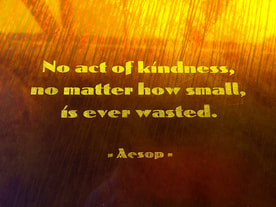|
Over the holiday season this year I spent some time with one of my best friends. We've known each other for 25 years, and he is one of the kindest, happiest, most compassionate people I know (I often joke that I would like to be more like him when I grow up!) Something I didn't know until recently is that he's been trying to do more RAKs - Random Acts of Kindness. Part of the way he does this means he doesn't brag about it, so he wouldn't tell me exactly what he's been doing, but I managed to get some things out of him over coffee. He's done things like donate food to the local food bank, buy items for a children's hospice, and pay for a drink for the person behind him in the coffee shop. It got me thinking about RAKs in general, and how many of them require energy and money that so many people just don't have. This blog post is going to think about kindness in general, and also has some ideas for low-impact activities that make a difference. Why be kind? Well, apart from the obvious (because it's the right thing to do in most circumstances!), it turns out that being altruistic has interesting effects on the body and mind. Helping others can:
Isn't altruism ultimately self-serving? That's certainly an idea that has been suggested in the past. Certain psychological theories would say that, because helping others feels good, you do it to feel better and not because you want to genuinely help others. That might be true, but I would also like to believe that altruism can be completely selfless (see Daniel Batson's work on empathy and altruism for more details). And in any case, if it's helping another person and also helping you, surely it's win-win! The interaction between RAKs and health So on the one hand, we're being told that Random Acts of Kindness can improve our health and well-being and also improve the lives of those around us. But what about when we have a chronic health condition, or we don't have the money to donate to good causes or buy people coffee? Should we just give up on the idea? I don't think we should. Some of the kindest, most compassionate people I know are those who don't have £10 to give to a stranger, who don't have the energy to walk to the local food bank, who still manage to act in ways that uphold the principles of RAK.  There are lots of things that you can do if you don't have much energy, or you're lacking in time, or you don't have the money to make grand gestures (or even small gestures). So much of our social lives revolve around money, or what we can physically do for another person, and whilst that can be important it's also important to remember that just because you can't do those things doesn't mean you can't help people. You are valid, and so are the things you do for yourself and for others. Things to do if you're lacking in time/money/energy for whatever reason:
0 Comments
Leave a Reply. |
AuthorDr Sarah Blackshaw: Clinical Psychologist, blogger, tea drinker, interested in dinosaurs and shiny objects Archives
January 2024
Categories
All
|
Photos from wuestenigel (CC BY 2.0), Ivan Radic (CC BY 2.0), Marco Verch (CC BY 2.0), John Brighenti, wuestenigel, simplicityhunter, Anarchimedia, Find Rehab Centers, wuestenigel, Ivan Radic, Army Medicine, kennethkonica, smallcurio, Jasmic, wuestenigel, JoanDragonfly, BrightStarPhoto21, popofatticus, wuestenigel, forthwithlife, kurotango Clip, ⍘dotism⍘, Tambako the Jaguar, One Click Group UK, Rawpixel Ltd, Blue Mountains Library, wuestenigel, mattbuck4950, h.koppdelaney, verchmarco, The Mom With a Camera, cloudplanner, wuestenigel, verchmarco, OIST (Okinawa Institute of Science and Technology), stevendepolo, juliejordanscott

 RSS Feed
RSS Feed